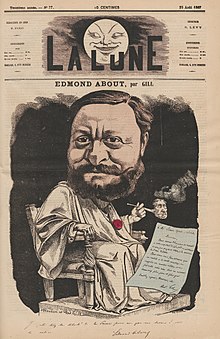| Revision as of 21:47, 5 November 2011 edit99.27.149.147 (talk) →Life← Previous edit | Revision as of 21:48, 5 November 2011 edit undo99.27.149.147 (talk) →CareerNext edit → | ||
| Line 9: | Line 9: | ||
| ==Career== | ==Career== | ||
| seat. | |||
| He made his name as an entertaining anti-clerical writer. The satirical ''Le roi des montagnes'' (1856; translated into English by ] as ''The King of the Mountains'') is the best-known of his novels. In Greece, About had noticed that there was a curious understanding between the brigands and police: brigandage was becoming almost a safe and respectable industry. About pushed this idea to invent the story of a brigand chief who converts his business into a registered ]. | |||
| ], 1858 (])]] | |||
| About's commentary on modern Greece, ''La Grèce contemporaine'' (1855), was an immediate success. But his ''Tolla'' (also published in 1855) gave rise to charges of drawing too freely on an earlier Italian novel, ''Vittoria Savelli'' (1841). This aroused prejudice against him, and he was the object of numerous attacks. The ''Lettres d'un bon jeune homme'', written to the '']'' under the signature of "Valentin de Quevilly", provoked more animosities. During the next few years, he wrote novels, stories, a play (which failed), a book-pamphlet on the Roman question, many pamphlets on other subjects of the day, innumerable newspaper articles, some art criticisms, rejoinders to the attacks of his enemies, and popular manuals of political economy, ''L'A B C du travailleur'' (1868), ''Le progrès'' (1864). His more serious novels include ''Madelon'' (1863), ''L'Infâme'' (1867), the three that form the trilogy of the ''Vieille Roche'' (1866), and ''Le roman d'un brave homme'' (1880) – a kind of counterblast to the view of the French workman presented in ]'s '']''. He is best remembered as a ], for the books ''Le nez d'un notaire'' (1862); ''Le roi des montagnes'' (1856); ''L'homme à l'oreille cassée'' (1862); ''Trente et quarante'' (1858); ''Le cas de M. Guérin'' (1862; see ]). | |||
| About's attitude towards the empire was friendly but critical. He greeted the liberal ministry of ] at the beginning of 1870 with delight, and welcomed the ]. But as a result of the war he lost his beloved home in ], which he had purchased in 1858 out of the fruits of his earlier literary successes. With the fall of the empire, he became a ], and threw himself into battle against conservative reactionaries. From 1872 to about 1877, his paper, the ''XIX<sup>e</sup> Siècle'' (''19th century''), became a power in the land. His political career, however, failed to advance further. | |||
| On 23 January 1884 he was elected a member of the ], but died before taking his seat. | |||
| ==References== | ==References== | ||
Revision as of 21:48, 5 November 2011


Edmond François Valentin About (14 February 1828 – 16 January 1885) was a French novelist, publicist and journalist.
Life
He
Career
seat.
References
 This article incorporates text from a publication now in the public domain: Chisholm, Hugh, ed. (1911). "About, Edmond Francois Valentin". Encyclopædia Britannica (11th ed.). Cambridge University Press.}
This article incorporates text from a publication now in the public domain: Chisholm, Hugh, ed. (1911). "About, Edmond Francois Valentin". Encyclopædia Britannica (11th ed.). Cambridge University Press.}- Benjamin Willis Wells, A Century of French Fiction, s. v., About
External links
| Preceded byJules Sandeau | Seat 11 Académie française 1884–1885 |
Succeeded byLéon Say |